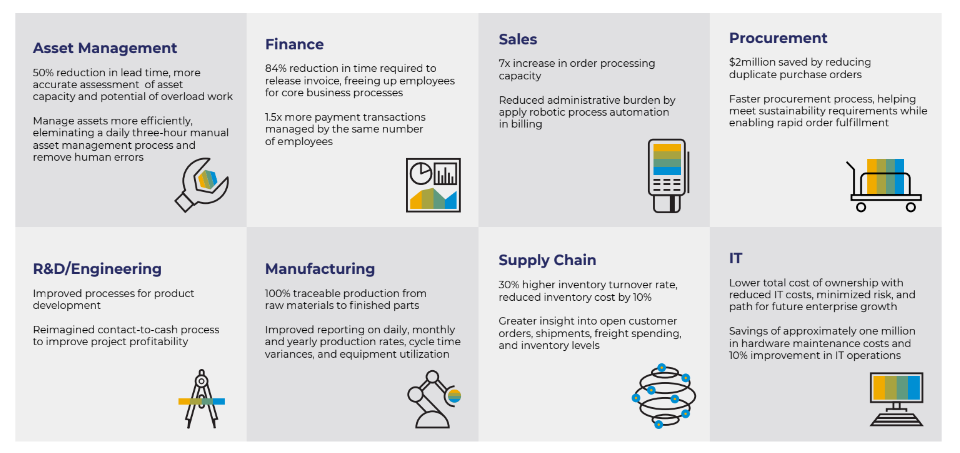
Why You Should Switch: Microsoft Great Plains Vs. SAP S/4HANA Cloud Public Edition
Companies that are migrating from a small business solution to more robust enterprise resource planning (ERP) software have many choices. Two popular options are Microsoft Dynamics Great Plains ERP and SAP S/4HANA Cloud Public Edition. But in the Great Plains vs. SAP S/4HANA Cloud battle, really there isn’t much of a competition. SAP has an edge in all but a few areas.
Microsoft bought the Great Plains ERP solution in 2000 and rolled it into what became known as MS Dynamics GP. Since then, Great Plains has been an ERP solution for small to mid-market businesses. Its fundamental strength is its integration with other Microsoft products, and its relatively easier learning curve (which still is significant since ERP is complex, company-wide software).
Recently Microsoft announced that is it rolling Great Plains into Dynamics 365, effectively migrating the solution again under a different Dynamics brand banner. But largely it is the same product, albeit more cloud-native now.
It is time to rediscover SAP ERP. SAP S/4HANA Cloud Public Edition is the public cloud version of ERP giant SAP’s flagship product, SAP S/4HANA. Some of the largest companies run S/4HANA, including Coca-Cola and British Petroleum. SAP has adapted the S/4HANA cloud version of the product for mid-market businesses by running it on a public cloud architecture to make adoption faster, more affordable, and less complex. But fundamentally S/4HANA Cloud Public Edition has almost all the power of SAP’s flagship product.
To support growth-focused businesses that want the power of S/4HANA Cloud without the considerable legwork, SAP also has baked-in configuration best practices by default and industry-specific processes. Further, it has built the Business Technology Platform (BTP) as a marketplace for easily installed add-ons and made a low-code development environment for extending S/4HANA Cloud Public Edition and for connecting just about any cloud service or third-party software through integration connections.
In the Great Plains vs. SAP S/4HANA Cloud comparison, Great Plains used to be for the mid-market and S/4HANA Cloud was for larger businesses, but the emergence of the S/4HANA Cloud Public Edition changed all that as both now serve the same market.
Great Plains vs. SAP S/4HANA Cloud
Both Great Plans and SAP S/4HANA Cloud Public Edition share a lot of the same core functionality. Both are ERP solutions for growth-focused to mid-market businesses that come with similar functionality that includes:
- Financial management
- CRM
- Distribution management
- Supply chain management
- Inventory management
- Project accounting management
- Reporting, dashboards, and business intelligence (BI)
In the Great Plains vs. SAP S/4HANA Cloud debate, however, S/4HANA Cloud Public Edition is far more robust and also includes deep functionality around automation, material resource planning, professional services, sales, and procurement, among others. The financial capabilities inherent in SAP S/4HANA also are deeper and better suited for more complex businesses with multiple country operations.
Further, SAP S/4HANA is the better choice for best-of-breed solutions since S/4HANA is built to connect with other systems more fully than Great Plains.
Historically, the advantage of Great Plains in the Great Plains vs. SAP S/4HANA Cloud comparison was reduced complexity and a better fit for smaller businesses. This advantage of Great Plains has been all but eliminated by the Public Edition of S/4HANA Cloud, however.
SAP has a clear migration path to S/4HANA from its fast-growing business ERP solution, SAP Business ByDesign. Business size and reduced complexity no longer is a Great Plains advantage, and now that consideration even favors SAP when it's Grow with SAP onboarding, the BTP platform, and the built-in best practices are considered.
The Clear Winner: SAP S/4HANA Cloud Public Edition
In the Great Plains vs. SAP S/4HANA Cloud debate, S/4HANA should be the clear choice for growth-focused businesses due to its robust and scalable nature as the business grows and requires more complex functionality.
This additional functionality does not come with unnecessary bloat or complexity, as S/4HANA Cloud is highly modular, allowing businesses to disable non-essential features until needed. Mid-size businesses can also start with SAP Business ByDesign and seamlessly migrate to S/4HANA as they expand, benefiting from the same SAP methodologies on a simpler scale.
While Microsoft Great Plains is a capable ERP solution for small to medium-sized businesses, SAP offers a superior migration path and more growth options. Comparing Great Plains to SAP S/4HANA Cloud consistently favors SAP, thanks to its industry-leading solutions.
SAP's dominance in the ERP market is no surprise, given its role in pioneering the ERP industry and its ongoing commitment to this core product. In contrast, Great Plains, now integrated into MS Dynamics 365, reflects Microsoft's broader business strategy rather than a focused ERP approach.
Ultimately, SAP S/4HANA Cloud Public Edition stands out not only for its advanced features and scalability but also for its clear migration path and modular flexibility. Businesses seeking a long-term ERP solution that can grow with them will find SAP's offerings to be a superior choice over Microsoft Great Plains.
Ready to elevate your ERP solution? Contact Navigator Business Solutions at (801) 642-0123 or email us at info@nbs-us.com to explore how SAP S/4HANA Cloud can transform your business.


